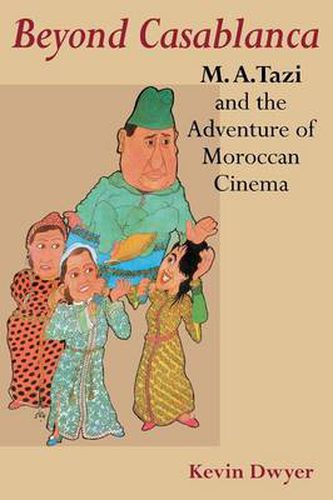Readings Newsletter
Become a Readings Member to make your shopping experience even easier.
Sign in or sign up for free!
You’re not far away from qualifying for FREE standard shipping within Australia
You’ve qualified for FREE standard shipping within Australia
The cart is loading…






In Beyond Casablanca , Kevin Dwyer explores the problems of creativity in the Arab and African world, focusing on Moroccan cinema and one of its key figures, filmmaker M. A. Tazi. Dwyer develops three themes simultaneously: the filmmaker’s career and films; filmmaking in postcolonial Morocco; and the relationship between Moroccan cinema, Third World and Arab cinema, and the global film industry. T his compelling discussion of Moroccan cinema is founded upon decades of anthropological research in Morocco, most recently on the Moroccan film sector and the global film industry, and exhibits a sensitivity to the cultural, political, social, and economic context of creative activity. The book centres on a series of interviews conducted with Tazi, whose career provides a rich commentary on the world of Moroccan cinema and on Moroccan cinema in the world. The interviews are framed, variously, by presentations of Moroccan history, society, and culture; the role of foreign filmmakers in Morocco; thematic discussions of cinematic issues (such as narrative techniques, the use of symbols, film as an expression of identity, and problems of censorship); and the global context of Third World filmmaking.
$9.00 standard shipping within Australia
FREE standard shipping within Australia for orders over $100.00
Express & International shipping calculated at checkout
Stock availability can be subject to change without notice. We recommend calling the shop or contacting our online team to check availability of low stock items. Please see our Shopping Online page for more details.
In Beyond Casablanca , Kevin Dwyer explores the problems of creativity in the Arab and African world, focusing on Moroccan cinema and one of its key figures, filmmaker M. A. Tazi. Dwyer develops three themes simultaneously: the filmmaker’s career and films; filmmaking in postcolonial Morocco; and the relationship between Moroccan cinema, Third World and Arab cinema, and the global film industry. T his compelling discussion of Moroccan cinema is founded upon decades of anthropological research in Morocco, most recently on the Moroccan film sector and the global film industry, and exhibits a sensitivity to the cultural, political, social, and economic context of creative activity. The book centres on a series of interviews conducted with Tazi, whose career provides a rich commentary on the world of Moroccan cinema and on Moroccan cinema in the world. The interviews are framed, variously, by presentations of Moroccan history, society, and culture; the role of foreign filmmakers in Morocco; thematic discussions of cinematic issues (such as narrative techniques, the use of symbols, film as an expression of identity, and problems of censorship); and the global context of Third World filmmaking.